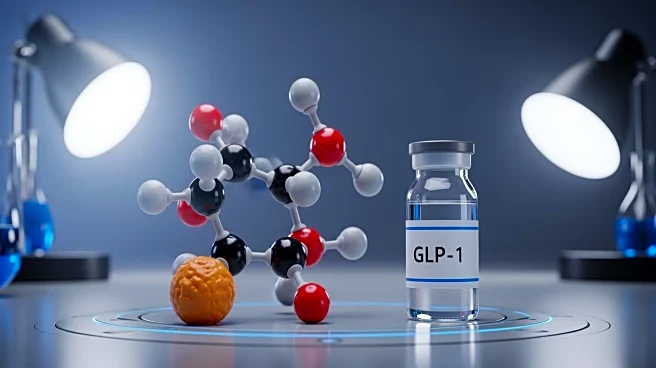What's Happening?
GLP-1 drugs, such as Ozempic and Mounjaro, are transforming the food industry's approach to nutrition by driving the movement towards precision nutrition. This concept involves tailoring dietary intake
to individual biological, metabolic, and behavioral profiles. The drugs have highlighted the variability in metabolism among individuals, prompting a shift in consumer eating patterns and preferences. Researchers are now focusing on the metabolomics of individuals, identifying multiple phenotypes within metabolic dysfunctions, which were previously thought to be singular. This understanding is paving the way for innovation in food products, including functional foods and supplements designed to support specific metabolic profiles.
Why It's Important?
The impact of GLP-1 drugs extends beyond weight loss, offering potential benefits in cardiovascular, neuro-protective, and anti-inflammatory areas. This scientific discovery is significant as it suggests that future food products could be designed to enhance health in targeted ways, not just modulate appetite. The rise of precision nutrition could lead to personalized dietary recommendations, supported by AI, that align with individual health goals. This shift challenges the traditional one-size-fits-all approach to nutrition, potentially revolutionizing the food industry and consumer expectations.
What's Next?
As the understanding of metabolic variability deepens, food manufacturers are likely to explore new product designs that incorporate molecules influencing GLP-1 pathways. This could lead to foods that offer similar benefits to GLP-1 drugs, creating a continuum of dietary interventions. AI will play a crucial role in this transformation, enabling faster innovation and hyper-personalization in food products. The industry may see the development of modular products that consumers can customize based on their unique body chemistry, further advancing the precision nutrition movement.
Beyond the Headlines
The integration of AI in precision nutrition represents a significant shift in how data is used to enhance health outcomes. By analyzing genomic, behavioral, and dietary data, AI can provide personalized dietary options, moving away from generic nutritional guidelines. This evolution reflects a broader trend towards personalized health solutions, driven by technological advancements and consumer demand for tailored experiences. As precision nutrition becomes more mainstream, it may redefine the relationship between food and health, emphasizing the role of diet in achieving optimal well-being.








